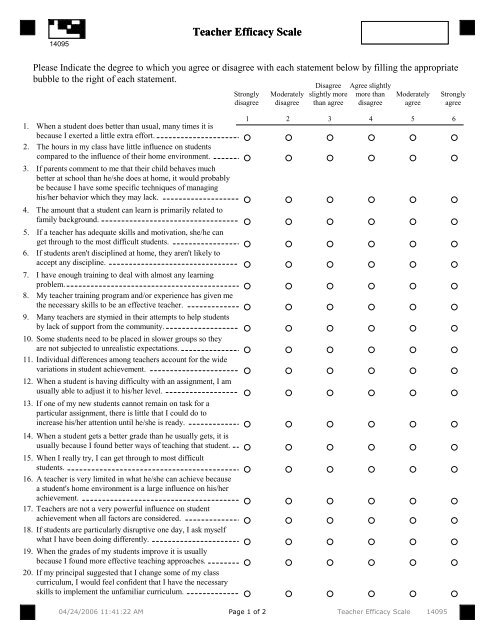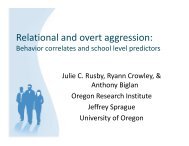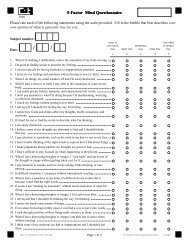Teacher Efficacy Scale (14095 - - Center on Early Adolescence
Teacher Efficacy Scale (14095 - - Center on Early Adolescence
Teacher Efficacy Scale (14095 - - Center on Early Adolescence
Create successful ePaper yourself
Turn your PDF publications into a flip-book with our unique Google optimized e-Paper software.
<str<strong>on</strong>g>14095</str<strong>on</strong>g><str<strong>on</strong>g>Teacher</str<strong>on</strong>g> <str<strong>on</strong>g>Efficacy</str<strong>on</strong>g> <str<strong>on</strong>g>Scale</str<strong>on</strong>g>Please Indicate the degree to which you agree or disagree with each statement below by filling the appropriatebubble to the right of each statement.Str<strong>on</strong>glydisagreeModeratelydisagreeDisagreeslightly morethan agreeAgree slightlymore thandisagreeModeratelyagreeStr<strong>on</strong>glyagree1. When a student does better than usual, many times it isbecause I exerted a little extra effort.2. The hours in my class have little influence <strong>on</strong> studentscompared to the influence of their home envir<strong>on</strong>ment.3. If parents comment to me that their child behaves muchbetter at school than he/she does at home, it would probablybe because I have some specific techniques of managinghis/her behavior which they may lack.4. The amount that a student can learn is primarily related tofamily background.5. If a teacher has adequate skills and motivati<strong>on</strong>, she/he canget through to the most difficult students.6. If students aren't disciplined at home, they aren't likely toaccept any discipline.7. I have enough training to deal with almost any learningproblem.8. My teacher training program and/or experience has given methe necessary skills to be an effective teacher.9. Many teachers are stymied in their attempts to help studentsby lack of support from the community.10. Some students need to be placed in slower groups so theyare not subjected to unrealistic expectati<strong>on</strong>s.11. Individual differences am<strong>on</strong>g teachers account for the widevariati<strong>on</strong>s in student achievement.12. When a student is having difficulty with an assignment, I amusually able to adjust it to his/her level.13. If <strong>on</strong>e of my new students cannot remain <strong>on</strong> task for aparticular assignment, there is little that I could do toincrease his/her attenti<strong>on</strong> until he/she is ready.14. When a student gets a better grade than he usually gets, it isusually because I found better ways of teaching that student.15. When I really try, I can get through to most difficultstudents.16. A teacher is very limited in what he/she can achieve becausea student's home envir<strong>on</strong>ment is a large influence <strong>on</strong> his/herachievement.17. <str<strong>on</strong>g>Teacher</str<strong>on</strong>g>s are not a very powerful influence <strong>on</strong> studentachievement when all factors are c<strong>on</strong>sidered.18. If students are particularly disruptive <strong>on</strong>e day, I ask myselfwhat I have been doing differently.19. When the grades of my students improve it is usuallybecause I found more effective teaching approaches.20. If my principal suggested that I change some of my classcurriculum, I would feel c<strong>on</strong>fident that I have the necessaryskills to implement the unfamiliar curriculum.1 2 3 4 5 604/24/2006 11:41:22 AMPage 1 of 2 <str<strong>on</strong>g>Teacher</str<strong>on</strong>g> <str<strong>on</strong>g>Efficacy</str<strong>on</strong>g> <str<strong>on</strong>g>Scale</str<strong>on</strong>g> <str<strong>on</strong>g>14095</str<strong>on</strong>g>
<str<strong>on</strong>g>14095</str<strong>on</strong>g><str<strong>on</strong>g>Teacher</str<strong>on</strong>g> <str<strong>on</strong>g>Efficacy</str<strong>on</strong>g> <str<strong>on</strong>g>Scale</str<strong>on</strong>g>Str<strong>on</strong>glydisagreeModeratelydisagreeDisagreeslightly morethan agreeAgree slightlymore thandisagreeModeratelyagreeStr<strong>on</strong>glyagree21. If a student masters a new math c<strong>on</strong>cept quickly, this mightbe because I knew the necessary steps in teaching thatc<strong>on</strong>cept.22. Parent c<strong>on</strong>ferences can help a teacher judge how much toexpect from a student by giving the teacher an idea of theparents' values toward educati<strong>on</strong>, discipline, etc.23. If parents would do more with their children, I could domore.24. If a student did not remember informati<strong>on</strong> I gave in aprevious less<strong>on</strong>, I would know how to increase his/herretenti<strong>on</strong> in the next less<strong>on</strong>.25. If a student in my class becomes disruptive and noisy, I feelassured that I know some techniques to redirect him quickly.26. School rules and policies hinder my doing the job I washired to do.27. The influences of a student's home experiences can beovercome by good teaching.28. When a child progresses after being placed in a slowergroup, it is usually because the teacher has had a chance togive him/her extra attenti<strong>on</strong>.29. If <strong>on</strong>e of my students couldn't do a class assignment, I wouldbe able to accurately assess whether the assignment was atthe correct level of difficulty.30. Even a teacher with good teaching abilities may not reachmany students.1 2 3 4 56Date:/ /ID:1 2 3 4 5 6 7 8Page 2 of 2 <str<strong>on</strong>g>Teacher</str<strong>on</strong>g> <str<strong>on</strong>g>Efficacy</str<strong>on</strong>g> <str<strong>on</strong>g>Scale</str<strong>on</strong>g> <str<strong>on</strong>g>14095</str<strong>on</strong>g>




